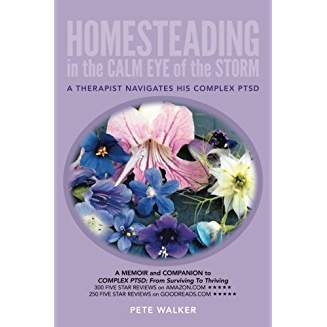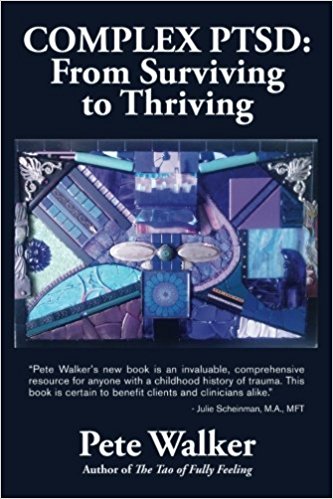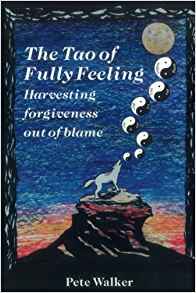Pete Walker’s Top Ten Practices for Navigating CPTSD: Part 1
/Pete Walker, therapist, author and himself a survivor of childhood trauma has kindly agreed to respond to questions/comments about the first five of his “Top 10 Ten Practices for Navigating CPTSD” from his third book “Homesteading in the Calm Eye of the Storm,” and the remaining five at a later date. We respectfully ask that you keep comments/questions general and do not include overly personal or lengthy information about your situation as this is a public blog and Pete has joined us to share his thoughts as a fellow traveler rather than provide therapeutic advice. Thank you!
Many readers write to me asking about the key to CPTSD recovery. As I wrote in Complex PTSD, I think there are many keys. Here are the top ten practices of my ongoing recovery. Thankfully the amount of time I need to dedicate to them has steadily decreased over the years. I use the words “practices” to emphasize that there are no fast fixes, singular solutions or final arrivals in CPTSD recovery. As unfair as it often seems, recovering is ninety percent perspiration and ten percent inspiration.
1. Milking Self-Kindness and Self-Protection out of Grieving
I go on endlessly about grieving because it’s brought me unparalleled relief. Most of the silver linings that I discovered about my trauma appeared on the other side of grieving. I am often tickled by the irony that a good cry leaves me feeling stronger and more confident. For decades, my tears dissolved my fear and confusion, and left me with a clear and hopeful sense of direction.
When I was 29, I was devastated when I saw my beautiful black Labrador, George, die under the wheels of a car. George! How I wished back then for someone who felt as safe and comforting as him. Miraculously, the overwhelming pain of his brutal death was washed away by a monsoon of tears. George’s demise opened me to the value of emoting. Previously my emotions were a great source of fear and shame. I almost always avoided them with a desperate repertoire of tricks. When my tears sprung forth that day, I was baptized with the Holy Spirit of grieving. Never again did I resist my tears. From then on I hungered for them until they became easily accessible.
When I was 39, my mother and my best dog, Herbie, died in short succession. My grieving for Herbie, who unconditionally loved me for ten years, totally eclipsed my grieving for Helen. In the heart of my mourning, I wrote this poem.
Herbie died and left me to find a new ride…
Left me with a precarious lead off first base…
Left me yearning to be picked off.
I see the pitcher chuck a knuckler
And mesmerized, I watch its loco dance.
I hear the stitches tumble a tune upon the air:
“Hey Pete, it sure is sweet and free up here.”
I never dream of my mother, but my Dreamtime has been graced generously over the years with comforting visits from Herbie. I well up now with tears of gratitude for Herbie, my high-grade social lubricant. Kind people were continuously drawn to this boddhisatvic dog…this mottled cattle dog of alluring homeliness. Herbie helped me many times to connect easily with her admirers. A few tears escape their wells as I remember her being lost in transport on a plane. The Airline kept sending her to the wrong airport, and I goose-chased her for two days from city to city before we reunited. When I opened her kennel, she sped around the airport floor in circles, skidding on the slippery linoleum in long tangents…then scrambling back into circling. She ran in unbridled joy at our reunification. Unable to contain her feelings, she manically lapped the waiting area a half-dozen times.
As I write, I flash back with compassion to my six-year-old hyperactive self – running around a car for an hour to escape the bully, Michael Carmody. He couldn’t catch me and I dared to laugh at him in his frustration. Sweet tears of grief sweetened with relief hallow the rebooting of these memories.
My tears – from the first drenching onwards – reliably rebirth me out of flashbacks. Crying is my get-out-of-jail-free card. It still occasionally rescues me from the death-pall of the abandonment depression, and revives my appreciation for being alive. I’m sure that grieving saved me from an early grave. Before my tears were easily accessible, I only had “accidents” and risks gone bad to release my pain. As my knack for grieving grew, my recklessness dried up and blew away. Yet no matter how wise my choices, how mindful my actions and how supportive my friends, life will deal me, like everyone else, an unfair slew of upsetting surprises.
Grieving is my tool kit par excellence for dealing with fortune’s outrages. Over and over, I find refuge In the Calm Eye of the Storm…of tears.
2. Whittling Down the Critic
My critic ruled the roost of my early life. Denial and minimization were its allies, until I realized I had become numb to its domination. In one transformative epiphany, I flashed: Oh my God! This critic is so hellaciously huge that it is the boss of me! I am perpetually over-focusing on the negative! Something powerful awoke in me and I thought: This is unacceptable! I will take back control of my mind…become the captain of my brain…exorcise the internalized drill sergeants of my parents and the Catholic Church. I will no longer salute the twisted flags they have brainwashed me to enshrine! No more unconsciously locking into step with the critic’s commands and judgments. And NO to perfectionism and its all-or-none thinking! NO to all those false alarms of seeing danger everywhere! NO to only seeing what’s wrong with me, with others and with life.
Early on my rebellion against the critic seemed hopeless. For a long time it seemed that all my efforts were making it worse. In truth, I was stuck in a gradually unfolding process of discovering its enormity. Like many of my clients, this failure created new reasons to hate myself: “I can’t do anything right. What’s wrong with me? Why don’t I just choose to love myself.” After breaking the record for spinning out in that nasty whirlpool, I finally saw my self-hate as my parents’ most poisonous legacy. Being continuously hated by them trained me to hate myself. “The gift that keeps on giving” has many references, but no “gift” is worse than being inculcated with an inner critic that eternally frowns at you with disgust.
During the early years of critic work, I gave up the fight many times. How could I hope to conquer this multifaceted foe! Maybe I should just go back to joking about being so self-critical, like Woody Allen and everyone else. Who could blame me? As my client, Mary Alice, once said: “That sucker has so many different ways of attacking you, it’s like playing whack-a-mole!” Many tools eventually helped, especially grieving self-compassionate tears. But shrinking it was glacial until I shifted into angrily counter-attacking it whenever I caught it biting me. The success of this fighting increased dramatically when I started visualizing the critic as an ugly two-headed beast: Charlie on the left and Helen on the right. I brought in the big guns when I added disgust to my anger – imagining that I was contemptuously giving them back their shame as well as their intimidation.
Innumerable times, I “dissed” them scornfully: Piss off Charlie and Helen! You heartless a-holes! You’re a nasty pair of cowardly child-beating bullies. Shut The F UP! Over and over, I countered the critic with contempt, mostly in the silence and privacy of my own mind. Over and over I imagined myself screaming at the critic with my parents’ favorite insults.
Before long this practice spontaneously triggered deep empathy for my child-self. I then translated this empathy into contradicting their slurs. After a moment or two, I’d move from anger into compassion for myself. I uttered many versions of: I love you little Pete. You’re a good kid. You’re smart, witty, resourceful, and so on. I am here for you and on your side no matter what. I repeated versions of this two-step process full-heartedly at least ten times a day, and within months the critic began to noticeably abate. Within a few years it disappeared for lengthening periods. One day as it tried for an encore, I saw it as a one winged fly that could not lift itself off the floor. I laughed at it: You’re a pathetic envoy of Helen and Charlie. Do you really think you still have any “cred” with me!?
On another memorable morning, I awoke in an intense flashback of self-disappointment and was soon rescued by this unprompted self-defense: So Herr Critic, aka Helen and Charlie, you used to run the show all the time. Now you’re lucky to get a few seconds. You used to be a class-5-rapids, but now you’re a seasonal trickle in a place where it rarely rains! So, PLEASE, let me invite you to GET THE HELL away from me! And POOF! Like magic, I was back on my side again.
Now it is almost always easy to dismiss the critic. It’s so weak, I rarely need the empowerment of anger. When it occasionally rearises, my current favorite response is a condescending response: Oh! It’s Mr. & Mrs. SMALL POTATOES again…trying to make a crisis out of something minuscule…something that truly is just SMALL POTATOES. I co-opted this phrase from my mother who used it to put down anything I did well. I use it instead as a reminder that her criticism is next to nothing to me now.
O, how far I’ve come! My mindfulness usually spots toxic criticisms immediately and I effortlessly let them wither away. Simply noticing the critic lures it into the quicksand of my healthy self-protection. I have whittled it down from commander-in-chief of my psyche to a mere shadow of its former self.
Now and for the last two decades I almost always feel like a good enough person.
3. Flight-into-Light
Like many survivors, my recovery process began unconsciously with a spiritual quest. I needed to find something profoundly good about life to counteract the soul crushing effects of my family. But striving for enlightenment was a salvation fantasy, and only helped marginally with my CPTSD. My Icarus-like flights into the Light did however give me powerful subjective experiences of a Benevolence at the core of life. Trying to permanently merge with this Light however, melted my waxen wings and repeatedly sent me plummeting into the sea of my abandonment depression. The Icarus in me won some and lost some. When I caught enough glimmers of the Light to know that an ultimate good exists, I felt buoyed enough to journey inside – to search for something worthwhile at my psychological core. When I finally learned to meditate effectively, I gradually found Spirit within.
Now my flights-into-light are sojourns inside to find an inner glow. My ongoing meditative practice regularly brings me helpful insights, restores my equanimity and self-acceptance, and occasionally provides me glimpses of THAT which is so much greater. My ultimate flight-into-light was an eight hour Enlightenment experience with LSD – an experience of feeling transcendently at one with a loving God that permeated everything. [What a surprise years later to read that Freud knew of this experience: “…the oceanic feeling…the sensation of harmony and interconnection with the universe.”]
This LSD journey, described in Chapter 6, impassioned me to search for permanent enlightenment. Luckily my quest short-circuited two years later, but I had enough tastes of God as Love to convince me that life is a stunning gift from an unfathomable and generous Creator. Like Walt Whitman and other poets, I increasingly saw love and beauty in life’s ordinary and myriad details. Delusional or not, I feel lucky to believe in a Benevolent Creator. This is not a choice but a profound subjective sense of knowing. The years before my huge epiphany – especially the Catholic ones – were desolately empty without this deep sense of a Higher Power.
And even if in death, my light is completely extinguished, I gained immeasurably from this vision. It blessed me with an increasing capacity to appreciate being alive.
4. Bibliotherapy
Books were my first teachers. They “introduced” me to compassionate adults who helped me with their wise and kind words. For decades I read my way into a better relationship with myself. The book that took the lid off my denial about my childhood trauma was Alice Miller’s The Drama of the Gifted Child. Reading it also took the floor out from under me, and dumped me into the bottomless basement of my abandonment depression:
An emotional maelstrom
Squared, cubed and taken to the highest Parental power.
A childhood full of hunger
unsootheable by food
cranking in the canyon of my belly.
Hunger born in an emotional famine
suffered in solitary confinement
behind the bars of a prison crib.
As horrible as the discovery of this unresolved pain was at the time, the ensuing Dark Night of the Soul awakened me to the grievous damage caused my parents’ abuse and neglect. Denial died, and I was lost in a sea of overwhelm for months. Recovery by Gravitz and Bowden subsequently gave me a sextant to begin navigating this sea. John Bradshaw’s books and videos released the pause button on my arrested development. His PBS videos on the dysfunctional family and inner child work were like a series of waves that I rode deeper into recovering.
Working with this material helped me recognize how often I went down the rabbit hole of self-hate. How awful that this eventually devolved into hating myself for hating myself. Thankfully, I finally realized that self-hate had been a childhood requirement rigorously enforced by my parents and the clergy. No wonder this habit was so hard to break! Gradually it began to crumble as I forgave myself over and over for repeating their brainwashing, and then invoked unconditional self-acceptance.
Other recommendations that I have for Bibliotherapy are contained in Chapter 15 of my CPTSD book. Let me also note that I am sure that many other valuable trauma-recovery books are now available, but I have not had the time to explore them.
5. Writing that Helped Me To Right Myself
Journaling was loving mothering and therapy for me. I could always bring my whole self – as small as it was as at first – to my journal and explore all my concerns. To this day, I still occasionally journal to plumb a gnarly issue. Journaling taught me to bear witness to myself – to validate that I was born innocent – unfairly deprived of a child’s birthright to be loved. Through no fault of my own, I got the joker from the parenting deck. Journaling helped me grieve this terrible loss. My four foot stack of journals is in many ways a history of how I reparented myself for fifty years.
I love writing. It feels like flirting with the unconscious – and on lucky days connecting with the Higher Self. My Muse often surprises me with unbidden jewels. Occasionally, they scintillate and make me teary. These wondrous and numinous tears feel like proof of God’s existence. A Jew or a Christian might say: “God created us in his own image…wanting us to also be creative.” Occasionally an inspiration makes me laugh aloud: “I didn’t know I knew that.” Wherever this inspiration comes from, I’m sure it’s not only my ego coughing up a new mixture of ideas it has heard before.
Pete Walker is a relational therapist in California who both suffers from and treats Complex PTSD. As many in the Out of the Storm community will attest, his books resonate deeply with those of us who endured trauma in childhood. At the same time as he shares his lived experience with us in a way we can understand, he offers us personal and therapeutic insights into navigating Complex PTSD. Pete's web site





